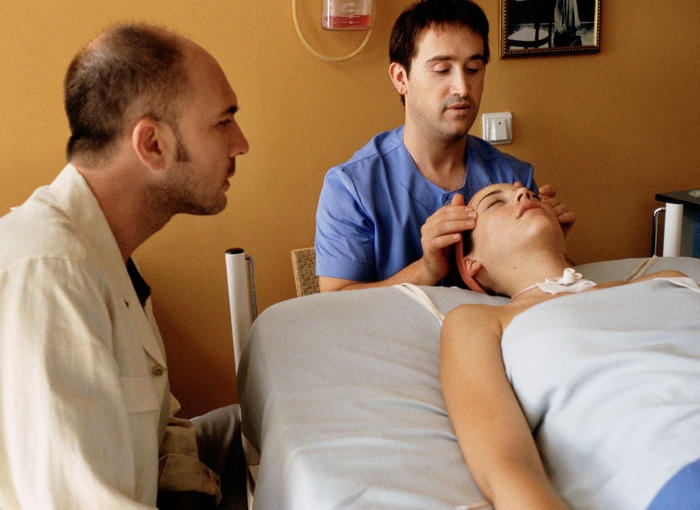6. ¡Atame! (1990)
Ricky (Antonio Banderas) escapes a mental institution in order to find Marina (Victoria Abril), a former porn star who is trying to reinvent her image with mainstream film work. Ricky kidnaps Marina under the assumption that she will eventually fall in love with him. The two fight (all the while Marina deals with tooth ache that she never took care of), but they eventually come together while “Resistiré” plays on their car radio.
¡Atame! (Tie Me Up! Tie Me Down!) was met with controversy in the States when it received an NC-17 rating for its depictions of sex (including Marina’s use of a scuba diver toy). It walks the fine line between art and pornography, but its gratuitous nature serves an artistic purpose. The film plays with the “Beauty and the Beast” narrative, following two people whose relationship and desires are played through their overt sexuality, not through sadomasochistic bondage.
5. La ley del deseo (1987)
Pablo (Eusebio Poncela) is a director and screenwriter who shares his success with his transsexual sister, Tina (Carmen Maura), and his on-again, off-again lover, Juan (Miguel Molina). However, Pablo’s fling with of one of his fans, Antonio (Antonio Banderas), leads to a chaos, which includes the murder of Juan.
La ley del deseo (Law of Desire) is a steamy romance filled with images of heat and fire (referencing the characters own obsessions and desires). Maura is the shining star of the film, creating a nuanced portrait of a transsexual woman who owns her own concept of femininity. Law of Desire is the first film produced under Almodóvar’s production company, El Deseo, which gave Almodóvar autonomous control over his future projects. The film also helped the director receive his first international accolades at the Venice Film Festival.
4. Mujeres al borde de un ataque de nervios (1988)
Pepa Marcos (Carmen Maura) is a voice-over actress who is primarily known as the TV mother of the “Cross Roads” killer. As Pepa tries desperately to contact her estranged boyfriend, Ivan (Fernando Guillén), she encounters a series of mishaps that include spiked gazpacho and Shiite terrorists.
Mujeres al borde de un ataque de nervios (Women on the Verge of A Nervous Breakdown) sealed Almodóvar’s reputation as a zany and madcap director. The film seamlessly integrates foreign influence (Johnny Guitar, “Soy Infeliz,” etc) with a Spanish flare (film dubbing, gazpacho, Spanish television), creating a uniquely Spanish vision that maintains an international appeal. It was his most polished work at the time, creating a new image for Spanish cinema. Sadly, it also marked the departure of Maura, who would not work with Almodovar until 2006’s Volver.
3. Todo sobre mi madre (1999)
Manuela (Cecilia Roth) is a grieving mother whose son was fatally injured in an accident. As Manuela donates his organs, she re-evaluates her conservative life in Madrid and decides to return to Barcelona in order to meet with her estranged husband, who never knew he had a son.
Todo sobre mi madre (All About My Mother) is the second entry of the “Brain Dead” trilogy, and is hands down my favorite film by Almodóvar. It blends the metaphor of transplantation with ideas of femininity, while also celebrating Spain’s liberal identity (Gaudi’s architecture, the sex circles of Barcelona, and the rehearsal of “Blood Wedding”). It deservedly won the Oscar for Best Foreign Language Film.
2. La mala educación (2004)
Enrique Goded (Fele Martinez), a successful director, has a chance encounter with a person claiming to be his old classmate, Ignacio (Gael Garcia Bernal). Ignacio offers Enrique a script about a fictionalized encounter with the priest who abused Ignacio in boarding school. The two develop an attraction for one another, but the revelation of Ignacio’s real identity throws Enrique (and the audience) into a tailspin.
More than any other film, La mala educación (Bad Education) seems to be Almodóvar’s most personal work. It includes themes that were seen in many of his previous films (multiple identities, two brothers, transsexual women), while filling in the narrative ellipses that were left in Law of Desire. It is evident that Enrique is modeled after Almodóvar, leaving one to wonder how much of this film is borrowed from real life.
1. Hable con ella (2002)
Benigno (Javier Cámara) and Marco (Dario Grandinetti) care for two comatose women – Alicia (Leonor Watling), who is a dancer, and Lydia (Rosario Flores), who is a bullfighter/Marco’s girlfriend. The two men continue to talk to the women in the hopes that they will wake up, but revelations and accusations of rape lead to severed ties between the quartet.
Hable con ella (Talk to Her) is Almodovar’s crowning achievement, mixing all of his themes and elements into a graceful masterpiece, while also winning the director an Oscar for Best Original Screenplay. It is an exploration of gender roles, vegetative states, and narrative ellipses that are told beneath the veneer of body language. It is a sublime masterpiece that not only showcased Almodovar’s maturation, but also displayed his humanity as a director.
Author Bio: Jose Gallegos is an aspiring filmmaker with a B.A. in Film Production/French from USC and an M.A. in Cinema, Media Studies from UCLA. His main interests are the French New Wave, Left Bank Cinema, and Spanish Cinema under Franco. You can read his film reviews at nextprojection.com and view his film poster collections at discreetcharmsandobscureobjects.blogspot.com.





